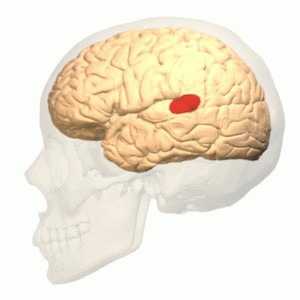Carl Wernicke
Carl Wernicke (15 May 1848 – 15 June 1905) was a German physician and neuropathologist who is best known for his identification of the part of the brain that is involved in language comprehension. This area is now known as Wernicke's area. His work significantly contributed to the understanding of the neural basis of language and the brain's structure and function.
Early Life and Education[edit | edit source]
Carl Wernicke was born in Tarnowitz, a town in what was then Prussia (now Tarnowskie Góry, Poland). He pursued his medical education at the University of Breslau (now Wrocław, Poland), where he was influenced by the work of Theodor Meynert, a prominent psychiatrist and neuropathologist. Wernicke graduated with a medical degree in 1870.
Career and Contributions[edit | edit source]
After completing his education, Wernicke began his medical career in the field of psychiatry. He quickly developed an interest in the anatomy of the brain and its relation to mental disorders. In 1874, Wernicke published a seminal work, Der aphasische Symptomenkomplex, which described a condition he termed "sensory aphasia." This condition was characterized by impairments in language comprehension, despite preserved speech production. Wernicke's observations led him to identify a specific region in the posterior part of the superior temporal gyrus in the left hemisphere of the brain as being critical for language comprehension. This region would later be named Wernicke's area in his honor.
Wernicke's work was groundbreaking because it provided evidence for the localization of brain function, particularly in relation to language. He proposed that language involved separate motor and sensory components, located in different parts of the brain. This was in contrast to the prevailing belief at the time that brain functions were not localized to specific areas. Wernicke also suggested that connections between these areas were crucial for normal language function, a concept that laid the groundwork for the development of the Wernicke-Geschwind model of language.
Throughout his career, Wernicke continued to explore the relationship between brain pathology and psychiatric disorders. He made significant contributions to the understanding of various neurological conditions, including aphasia, ataxia, and confusion states.
Legacy[edit | edit source]
Carl Wernicke's work has had a lasting impact on the fields of neurology and psychiatry. His identification of Wernicke's area and his contributions to the understanding of the neural basis of language have been fundamental to the development of modern neuroscience. Wernicke's area is considered a critical region for language comprehension, and disorders associated with it, such as Wernicke's aphasia, are central to the study of neurology and speech pathology.
Wernicke's approach to understanding the brain's function through its anatomy and pathology laid the foundation for future research in neuroscience. His work exemplifies the importance of detailed clinical observation and the integration of clinical and anatomical research in advancing medical science.
Death[edit | edit source]
Carl Wernicke died on 15 June 1905 in Graz, Austria, at the age of 57. His contributions to medicine, particularly in the field of neurology, continue to be celebrated and studied by medical professionals and researchers around the world.
Search WikiMD
Ad.Tired of being Overweight? Try W8MD's physician weight loss program.
Semaglutide (Ozempic / Wegovy and Tirzepatide (Mounjaro / Zepbound) available.
Advertise on WikiMD
|
WikiMD's Wellness Encyclopedia |
| Let Food Be Thy Medicine Medicine Thy Food - Hippocrates |
Translate this page: - East Asian
中文,
日本,
한국어,
South Asian
हिन्दी,
தமிழ்,
తెలుగు,
Urdu,
ಕನ್ನಡ,
Southeast Asian
Indonesian,
Vietnamese,
Thai,
မြန်မာဘာသာ,
বাংলা
European
español,
Deutsch,
français,
Greek,
português do Brasil,
polski,
română,
русский,
Nederlands,
norsk,
svenska,
suomi,
Italian
Middle Eastern & African
عربى,
Turkish,
Persian,
Hebrew,
Afrikaans,
isiZulu,
Kiswahili,
Other
Bulgarian,
Hungarian,
Czech,
Swedish,
മലയാളം,
मराठी,
ਪੰਜਾਬੀ,
ગુજરાતી,
Portuguese,
Ukrainian
Medical Disclaimer: WikiMD is not a substitute for professional medical advice. The information on WikiMD is provided as an information resource only, may be incorrect, outdated or misleading, and is not to be used or relied on for any diagnostic or treatment purposes. Please consult your health care provider before making any healthcare decisions or for guidance about a specific medical condition. WikiMD expressly disclaims responsibility, and shall have no liability, for any damages, loss, injury, or liability whatsoever suffered as a result of your reliance on the information contained in this site. By visiting this site you agree to the foregoing terms and conditions, which may from time to time be changed or supplemented by WikiMD. If you do not agree to the foregoing terms and conditions, you should not enter or use this site. See full disclaimer.
Credits:Most images are courtesy of Wikimedia commons, and templates, categories Wikipedia, licensed under CC BY SA or similar.
Contributors: Prab R. Tumpati, MD

